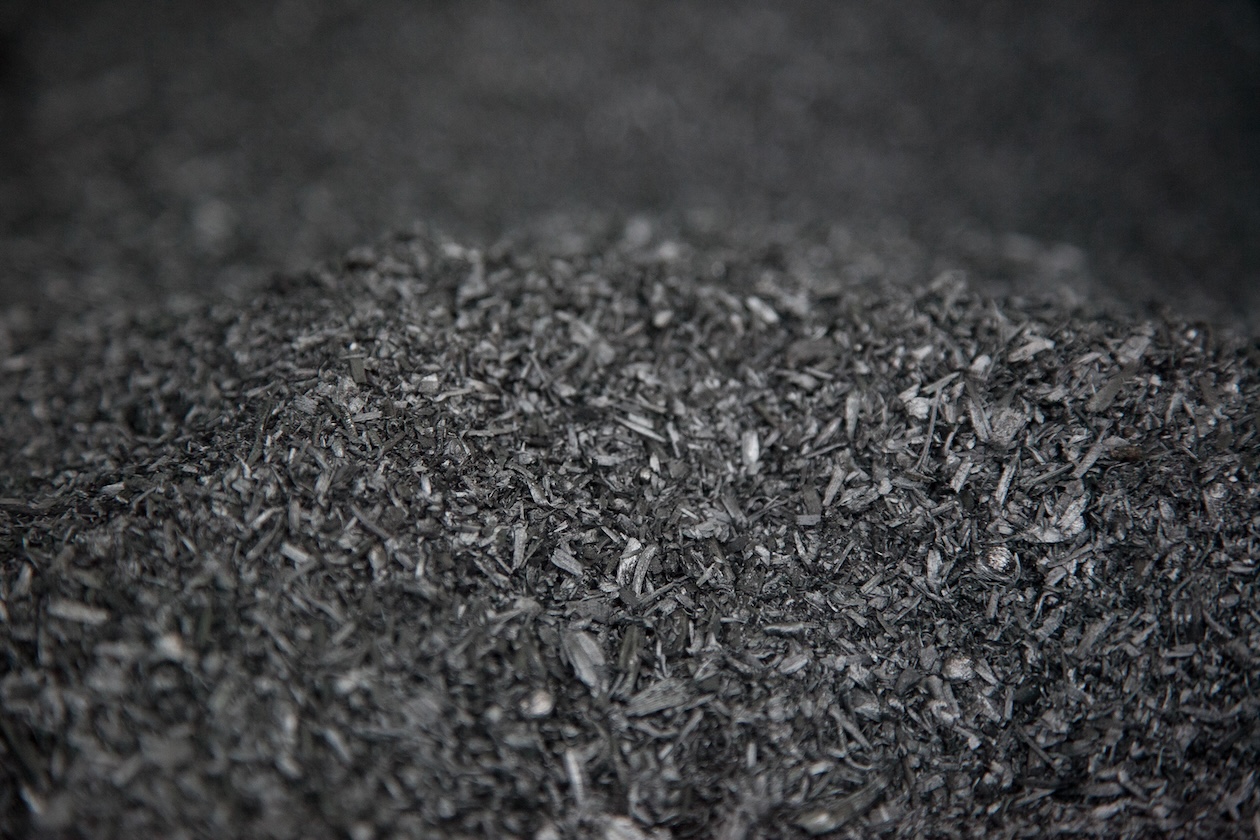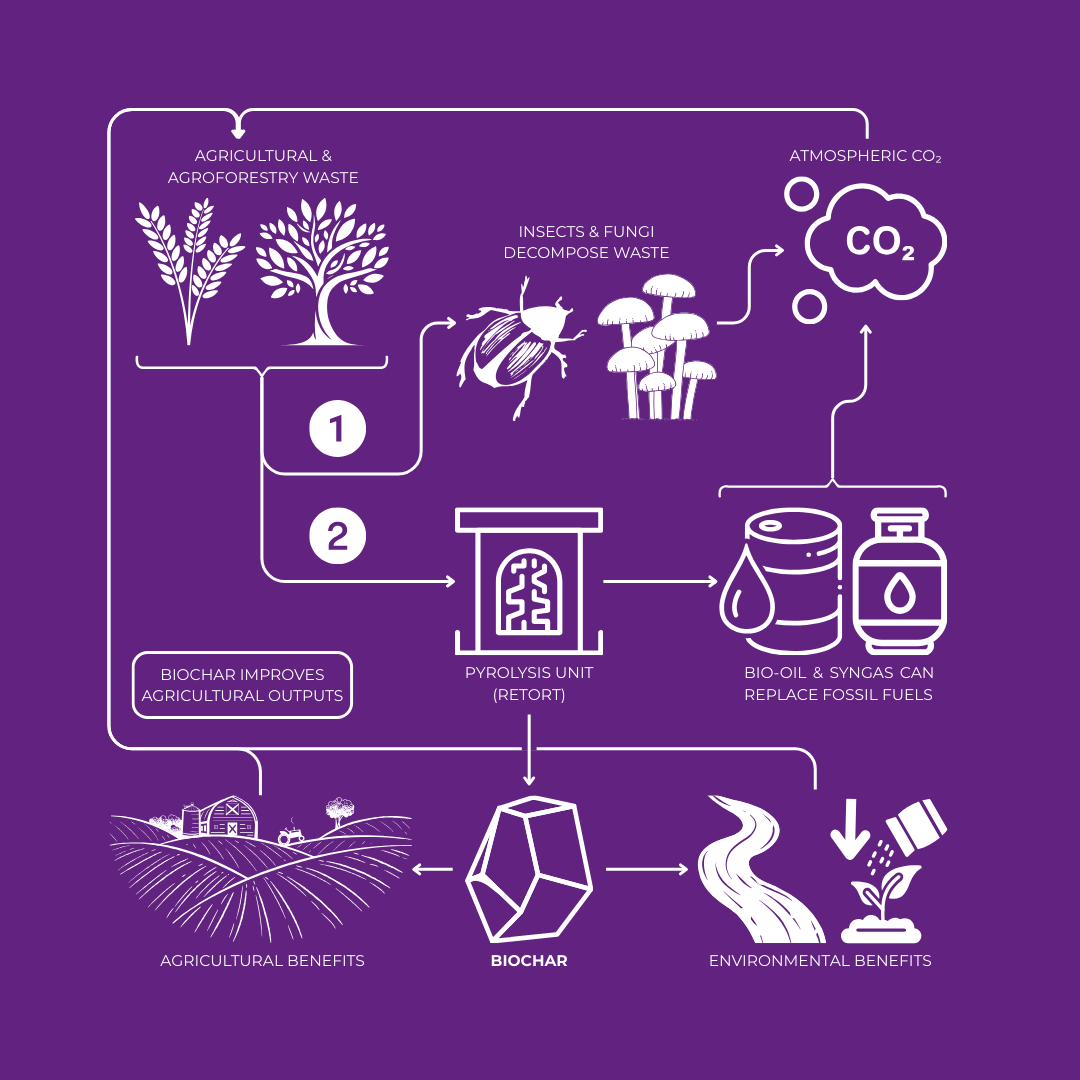How Biochar Can Boost Your Crops and Help the Planet

Introduction
What if there was a simple soil addition that could make your plants more resilient to drought, reduce the need for fertiliser, and actively fight climate change by locking carbon away for centuries? It sounds too good to be true, but this powerful tool exists. It's called biochar, and – despite being used for centuries – it's a hot topic among farmers, gardeners, and climate scientists alike.
What Exactly is Biochar?
Think of biochar as super-charged charcoal. But instead of burning your sausages, it's a soil additive designed to improve its health and fertility. It's a stable, carbon-rich material made from heating plant material – like wood, crop waste, or even manure – in a low-oxygen environment.
This process, called pyrolysis, is like baking rather than burning. Without a supply of oxygen, the carbon in the plant material doesn't turn into carbon dioxide (CO₂) and return to the atmosphere. Instead, it gets locked into a new, spongy, and stable structure: biochar.
Modern pyrolysis units are highly efficient and can also capture other useful byproducts like bio-oil and syngas, which can be used as renewable fuels. But for those with their hands in the soil, the true magic is in the solid black gold left behind.
 Comparison of the natural carbon cycle – where organic matter decomposes and returns CO₂ to the air – and the biochar cycle, which captures much of that carbon in stable biochar applied to agricultural fields.
Comparison of the natural carbon cycle – where organic matter decomposes and returns CO₂ to the air – and the biochar cycle, which captures much of that carbon in stable biochar applied to agricultural fields.The Benefits: Why Should You Use Biochar?
Biochar's unique honeycomb-like structure, formed when water evaporates from inside plant material during pyrolysis, gives it incredible properties. A single five-gram piece can have the same surface area as a football pitch. This immense surface area is the secret behind the many benefits of biochar.
Biochar For Your Soil & Plants
Better Aeration:
Plant roots need to breathe. Anyone who's ever overwatered a houseplant has been painfully reminded of this fact! The space left behind by evaporated water within biochar creates tiny air pockets, allowing roots to thrive in any soil type.
Acts Like a Sponge:
Its porous structure holds onto water, acting like tiny reservoirs in the soil. During wet weather, biochar soaks up excess water and only releases it during drier spells. This helps plants – both in the garden and the field – survive periods of drought, which are becoming more common in the UK.
A Nutrient Hub:
It's not just water that biochar can soak up. Biochar is brilliant at holding onto nutrients when enriched with fertilisers – like farmyard manure, worm castings, and seaweed. Its structure also provides the perfect habitat for beneficial fungi, which help plants make the most of the available nutrients.
Soil Detox:
There's also good evidence that biochar can absorb harmful heavy metals – like arsenic, lead, and mercury – preventing them from being taken up by plant roots and entering the food supply chain.
Biochar For the Planet
Carbon Sequestration:
Biochar's climate change cheat-code: decomposing plants release carbon captured during their life back into the atmosphere. In fact, decaying trees worldwide emit more carbon dioxide than fossil fuels! Converting plant material to biochar and burying it locks this carbon away for centuries.
Replacing Fossil Fuels:
Pyrolysis, the process that creates biochar, also produces liquid bio-oil and synthetic gas – syngas. Between burying biochar and replacing fossil fuels with its byproducts, the pyrolysis of a sustainable fraction of annual plant waste could offset global emissions by up to 12%.
Prevents Water Pollution:
Artificial fertilisers dissolve easily in water, so heavy rain and irrigation can wash them into rivers and streams. There, algae use them to grow rapidly, covering the water's surface and suffocating all other life. The addition of biochar helps keep fertilisers in the soil, protecting aquatic plants and animals.
Reduced Fertiliser Use:
Fertiliser production accounts for 10.6% of agricultural emissions. By reducing the run-off, or leaching, of fertilisers from the soil where they're needed, biochar application could reduce the quantities of fertiliser required to produce our food – and the emissions from its production.
Biochar in Action: A Kent & Medway Story
The potential of biochar is being actively explored right here in our region. Richard Bowe from Re-generation Earth, in collaboration with Dr Anastasios Tsaousis from the University of Kent, recently completed a Growing Kent & Medway-funded project to test biochar production and application on a local farm.
They found that when 'charged' with local organic fertilisers like manure and insect frass, biochar acted as a fantastic slow-release fertiliser for the soil. The project also highlighted some of the real-world challenges of on-farm production, demonstrating that optimising the equipment and approaches are key to ensuring the process is genuinely carbon-negative.
As Richard puts it, "Over the last two years, we've got significant benefits from the use of biochar, but it will take a 20-year study to get really down into the benefits of it." Want to learn more? To see this project in action and hear directly from Richard Bowe about his biochar journey, watch our video below!
Is Biochar a Perfect Solution?
While the promise is huge, it's not a silver bullet. There are a few challenges to consider for widespread adoption:
- Cost: High-efficiency pyrolysis equipment is expensive, which can be a barrier for smaller farms or gardeners.
- Sourcing Biomass: The organic material used to make biochar must be from sustainable sources and shouldn't compete with food production or conservation.
- Application: Biochar is lightweight, making its application to farmland challenging. More research is needed to establish optimal incorporation methods and maximise its soil‑health benefits – potentially by combining it with sustainable fertilisers such as slurry or manure.
- More Research: While the benefits are clear, more long-term studies are needed to understand the effects on different soil types across the UK.
Conclusion
Biochar is more than just charcoal; it's a powerful and versatile tool in our mission for more sustainable agriculture and a healthier planet. By improving soil health, boosting crop resilience, and locking carbon safely underground, it offers a rare win-win-win situation. While challenges remain in scaling up production, the pioneering work happening right here in Kent & Medway shows that the future for this ancient innovation is incredibly bright.
